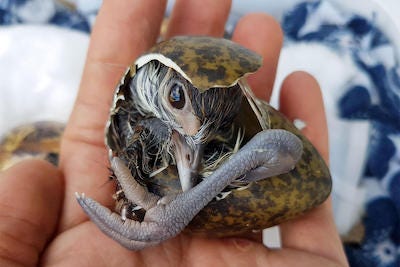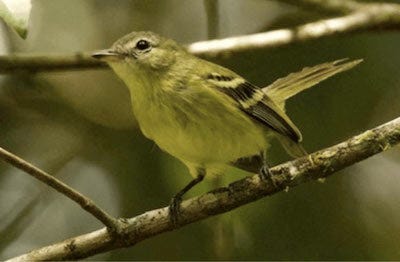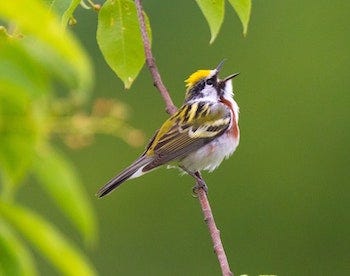The Weird Times: Issue 57, June 13 2021 (V2 #4)
Cut the heat—
plough through it,
turning it on either side
of your path. — Hilda Doolittle (H.D.)
Turning and turning in the widening gyre
The falcon cannot hear the falconer;
Things fall apart; the centre cannot hold;
Mere anarchy is loosed upon the world,
The blood-dimmed tide is loosed, and everywhere
The ceremony of innocence is drowned;
The best lack all conviction, while the worst
Are full of passionate intensity. —W.B. Yeats, born June 13, 1865
June 13, 1966, the U.S. Supreme Court handed down its decision in Miranda v. Arizona, establishing the principle that all criminal suspects must be advised of their rights before interrogation. Now considered standard police procedure, “You have the right to remain silent. Anything you say can, and will, be used against you in court of law. You have the right to an attorney. If you cannot afford one, one will be appointed to you,” has been heard so many times in television and film dramas that it has become almost cliche. It has not been all that long since these rights were not protected.
June 12, 1970 Dock Ellis Pitches No Hitter while on LSD

Jim “Mudcat” Grant died June 11th. He was 85. Grant was the first Black pitcher in the American League to win 20 games in a single season. He pitched for the Minnesota Twins, Cleveland Indians, Montreal Expos, St. Louis Cardinals and Pittsburgh Pirates over a 14-year career. He was selected by the Montreal Expos in their expansion draft and then started the first game in franchise history in 1969.
Grant helped the Twins post a 102-60 record in 1965, led the league with six shutouts, and then started three times in the World Series against the Los Angeles Dodgers. He won two games — including a 5-1, complete-game victory in Game 6, during which he also hit a three-run homer.
Grant’s experiences with racism and his interest in Black history inspired him to write The Black Aces: Baseball’s Only African-American Twenty-Game Winners.
He was a singer too, and a good one. Here is Mudcat Grant singing What a Wonderful World at the Harmon Killebrew Memorial event in 2011.
Birdland
Isle of Man puffins: Birds return to island after three decades, Ellan Vannin, BBC News, 6/9/21
Puffins have returned to the Calf of Man for the first time in more than 30 years with the help of a special programme using model "decoys" of the seabirds to help lure them back.
Where do birds fly? Tracking backpacks hold the answer, Christina Larson, Christian Science Monitor, 6/9/21
With new technological advances, including smaller, lighter tracking chips, scientists can tag a larger variety of bird species. The data from these tags, which can be retrieved without re-capture, may solve mysteries about migratory patterns and population decline.

Do Birds Hide From Predators Even From Inside an Egg? Before hatching, shorebird embryos sometimes vocalize to their parents. New research shows they can also quiet down when danger is near, Carolyn Cowan, Audubon, 6/10/21
When under attack, people and animals alike have an inbuilt fight or flight instinct. But hatchlings of ground-nesting birds can neither flee nor defend themselves; their response in the face of danger is to hunker down and mute their cries.
It turns out that this innate behavior does not just begin on hatching. Surprisingly, it is already evident while chicks are still in the egg, according to findings published in May.
Frightened terns abandon 3,000 eggs after drone illegally crashes on beach: Departure marks one of the largest-scale abandonments of eggs ever at coastal site north of San Diego, Associated Press, The Guardian, 6/4/21
About 3,000 elegant tern eggs were abandoned at a southern California nesting island after a drone crashed and scared off the birds, a newspaper reported Friday.
Two drones were flown illegally over the Bolsa Chica ecological reserve in Huntington Beach in May and one of them went down in the wetlands, the Orange County Register said.
Fearing an attack from a predator, several thousand terns abandoned their ground nests, according to the state department of fish and wildlife.
Now, during the month when the birds would be overseeing their eggs as they begin to hatch, the sand is littered with egg shells.
Songbirds can control single vocal muscle fibers when singing, Univ So Denmark, Science Daily, 6/4/21
Songbirds produce their beautiful songs using a special vocal organ unique to birds, the syrinx. It is surrounded by muscles that contract with superfast speed, two orders of magnitude faster than e.g. human leg muscles.
"We found that songbirds have incredible fine control of their song, including frequency control below one Hertz," says Iris Adam, lead author on the study and Assistant Professor at Department of Biology, University of Southern Denmark.
Tiny Passerine Bird Rediscovered in Venezuela: Urich’s Tyrannulet,Natali Anderson, Sci-News, 6/8/21
It has a short bill, a long tail, a pinkish lower mandible, whitish lores, and yellowish wingbars.
There have only been three confirmed sightings of the Urich’s tyrannulet since it was first described in 1899; the second sighting was in the 1940s and the third in 2005.
Essential California: The pandemic and the scrub jays, Scott Sandell, LA Times, 6/1/21
Though they’re not enshrined as the state bird, as the California quail is, or protected as an endangered species, as the California condor is, there’s something quintessentially Californian about these boisterous, screeching, blue-and-gray birds that can be seen in parks, yards and wooded areas along the western part of the Golden State, as well as the Pacific Northwest and Baja California.
‘Birds are here for everyone’: how Black birdwatchers are finding a community: In a 2011 study by the Fish and Wildlife Service, 93% of birders surveyed were white while just 4% were Black, Aliua Uteuova, The Guardian, 6/8/21
“I felt the most seen that I have felt in a long time, as far as being Black in the field of wildlife,” said Jordan Veasley, a zookeeper and a wildlife conservationist taking part in the Black Birders Week out of Seattle. In addition to working with animals at a zoo setting, he makes educational videos on social media. “I felt like people are finally noticing my work and seeing me in this field.”
Brainland
Google has mapped a piece of human brain in the most detail ever, Michael Marshall, New Scientist, 6/7/21
Google has helped create the most detailed map yet of the connections within the human brain. It reveals a staggering amount of detail, including patterns of connections between neurons, as well as what may be a new kind of neuron.
The brain map, which is freely available online, includes 50,000 cells, all rendered in three dimensions. They are joined together by hundreds of millions of spidery tendrils, forming 130 million connections called synapses. The data set measures 1.4 petabytes, roughly 700 times the storage capacity of an average modern computer.
A New Way to Understand the Brain's Intricate Rhythm: Researchers have found evidence in humans that individual neurons time their firing to a deeper beat. But there’s a mystery: What does it mean? Grace Huckins, WIRED, 6/11/21
A neuron’s firing rate provides coarse, approximate information about an animal’s location—but the exact degree to which a neuron is out-of-sync with the theta rhythm can be a bit more precise. “It’s a way of taking the [firing] rate code of a neuron and chopping it into smaller bits and increasing the resolution,” Jeffery says.
Another theory is that phase precession might be essential to learning. It allows neurons associated with a sequence of locations in space to fire one after another within the timespan of a single theta oscillation—a fraction of a second—as opposed to the several seconds it would take the animal to actually traverse that space. Since the brain’s learning machinery also works on a very fast timescale, phase precession might allow animals to learn sequences.
The Psychological Benefits of Commuting to Work: Many people who have been working from home are experiencing a void they can’t quite name, Jerry Useem, The Atlantic, 6/9/21
But here’s the strange part. Many people liberated from the commute have experienced a void they can’t quite name. In it, all theaters of life collapse into one. There are no beginnings or endings. The hero’s journey never happens. The threshold goes uncrossed. The sack of Troy blurs with Telemachus’s math homework. And employers—even the ones that have provided the tools for remote work—see cause for alarm. “No commute may be hurting, not helping, remote worker productivity,” a Microsoft report warned last fall. After-hours chats were up 69 percent among users of the company’s messaging platform, and workers were less engaged and more exhausted.
America's scarcity mindset: Is our society turning into a zero-sum competition for survival? Noah Smith, Noahpinion, 6/7/21
So America has created artificial scarcities of tangible goods like housing, education, and access to the country, and intangibles like a sense of belonging. Not all of our scarcities are artificial, of course — high-paying jobs at top companies like Google are limited due to the superstar firm phenomenon. But for the most part, the things Americans are scrabbling to take from each other are things whose supply we have chosen to limit.
The Land
When the Bison Come Back, Will the Ecosystem Follow? An effort to bring wild buffalo to the Great Plains aims to restore one of the world’s most endangered landscapes and increase climate resilience, Louise Johns, WIRED, 6/12/21
How Returning Lands to Native Tribes Is Helping Protect Nature: From California to Maine, land is being given back to Native American tribes who are committing to managing it for conservation. Some tribes are using traditional knowledge, from how to support wildlife to the use of prescribed fires, to protect their ancestral grounds, Jim Robbins, Yale Environment 360, 6/3/21
Bad news for fishing: Climate change is sucking the oxygen out of lakes, study suggests: Warming reduces transfer of oxygen from air to water, boosts algae blooms that consume oxygen, Emily Chung, Alice Hopton, Bonnie Allen, CBC News, 6/10/21
Salmon face extinction throughout the US west. Blame these four dams: Salmon are headed to a point of no return throughout the US west. And the impact on Native American communities could be devastating, Hallie Golden, The Guardian, 6/9/21
The Drought Is Making the Klamath River’s Baby Salmon Sick: Dry conditions are worsening a warm-water disease that’s sweeping through juvenile fish. Their deaths will create a future crisis for both fish and human populations, Anna V. Smith, WIRED, 6/5/21
Why the Great Lakes need to be the center of our climate strategy:If you’re looking for a strategy to get the most value from climate investments, the answer is simple: Cities like Detroit, Cleveland, and Buffalo will still be livable as the climate changes, and have the space to absorb climate migrants, Kelly Leilani Main and Greg Lindsay, Fast Company, 6/10/21
How to Protect Species and Save the Planet—at Once: A major new report calls on humanity to tackle the biodiversity and climate crises simultaneously. Here's what that might look like, Matt Simon, WIRED, 6/10/21
A hallucinogenic toad in peril: How a Sonoran Desert species got caught up in the commodification of spiritual awakening, Jessica Kutz, High Country News, 6/10/21
Europe’s Drive to Slash Plastic Waste Moves Into High Gear: As part of a broader effort to create a circular economy that reduces waste and greenhouse gas emissions, the European Union will ban a host of throwaway plastic items next month and is working to create an expansive and lucrative market for recycled plastics, Paul Hockenos, Yale Environment 360, 6/9/21
How Canada is moving to end the systemic ‘environmental racism’ that has been the toxic burden of racialized and Indigenous people for decades, Nicholas Keung, Toronto Star, 6/6/21
Solar geoengineering: Scientists decry a 'foolish' idea: Ideas to dim the sun 'ignore the root cause' of the climate crisis – and create a cascade of unintended problems, scientists and activists say, Douglas Fischer, Daily Climate, 6/11/21
Don't compromise science when protecting water quality in the nation’s rivers and streams: Follow the science – which Obama used and Trump ditched – in developing a new definition of "waters of the US" under the Clean Water Act, Derrick Z. Jackson, Environmental Health News, 6/3/21
New tech cheaply produces lithium and H2, while desalinating seawater, Loz Blain, New Atlas, 6/7/21
The Body Politic
How America Fractured Into Four Parts: People in the United States no longer agree on the nation’s purpose, values, history, or meaning. Is reconciliation possible? George Packer, The Atlantic, July/August 2021
Nations, like individuals, tell stories in order to understand what they are, where they come from, and what they want to be. National narratives, like personal ones, are prone to sentimentality, grievance, pride, shame, self-blindness. There is never just one—they compete and constantly change. The most durable narratives are not the ones that stand up best to fact-checking. They’re the ones that address our deepest needs and desires. Americans know by now that democracy depends on a baseline of shared reality—when facts become fungible, we’re lost. But just as no one can live a happy and productive life in nonstop self-criticism, nations require more than facts—they need stories that convey a moral identity. The long gaze in the mirror has to end in self-respect or it will swallow us up.
Why Fox News Has Blood on Its Hands: Brian Stelter on the Disastrous Downplaying of Coronavirus as a ”Hoax” Brian Stelter, Lithub, 6/8/21
Fox News enabled Donald Trump in ways that changed the country forever. Trump was afflicted by “Fox News brain,” a diagnosis that was ID’ed by a White House aide. It was fun for a while, at least for Fox stars like Sean Hannity, to treat the most powerful man in the world like a marionette. But in 2020 and 2021 the Trump-Fox feedback loop had life-and-death consequences. And there has to be a reckoning.
Watch What’s Happening in Red States: In states where Republicans control the legislature, American life is rapidly changing, Ronald Brownstein, The Atlantic, 6/3/21
Though this year’s proliferation of bills restricting ballot access in red states has commanded national attention, it represents just one stream in a torrent of conservative legislation poised to remake the country. GOP-controlled states—including Florida, Tennessee, Georgia, Texas, Arizona, Iowa, and Montana—have advanced their most conservative agenda in years, and one that reflects Donald Trump’s present stamp on the Republican Party.
Across these states and others, Republican legislators and governors have operated as if they were programming a prime-time lineup at Fox News. They have focused far less on the small-government, limited-spending, and anti-tax policies that once defined the GOP than on an array of hot-button social issues, such as abortion, guns, and limits on public protest, that reflect the cultural and racial priorities of Trump’s base.
Covid Brings Automation to the Workplace, Killing Some Jobs: Unable to find enough workers, employers are turning to technology to perform tasks—and women are likely to be the hardest hit, Will Knight, WIRED, 6/7/21
Unable to find enough workers, Chuck Cooper, CEO of Lee’s Famous Recipe Chicken, installed an automated voice system in many locations to take orders. The system, developed by Intel and Hi Auto, a voice recognition firm, never fails to upsell customers on fries or a drink, which Cooper says has boosted sales. At outlets with the voice system, there’s no longer a need for a person to take orders at the drive-thru window. “It also never calls in sick,” Cooper says.
Koch’s Americans for Prosperity Launches Nationwide Campaign to Oppose Biden’s Infrastructure Plan, Dan Wiener, Exposed by CMD, 5/24/21
Your Next Car and Clothes Dryer Could Help Save Our Planet, Senator Martin Heinrich, NY Times, 6/8/21
We need to get started today. And that requires three things. First, we need to invest in upgrading the breaker boxes in American homes so that they can take higher-capacity electrified appliances. These new breaker boxes will help to manage the load on a decarbonized grid. Second, we need to bring down the upfront costs of electrified appliances through rebates, incentives and low-cost financing to encourage consumers to buy them. Fossil-driven machines may be cheaper initially, but operating electrical machines will be cheaper far into the future, and their price will come down with economies of scale.
The Race to Build Solar Power in the Desert — and Protect Rare Plants and Animals: As development of large solar projects speeds up, researchers race against the clock to study the ecosystem implications, Tara Lohan, The Revelator, 6/7/21
“All of those [greenhouse gas reduction] goals entail really aggressive buildouts of renewable energy, which is a great thing in the sense that we can supplant and displace fossil fuels,” he says. “But that also gives us an opportunity to be able to guide the sustainable development of these renewables.”
And to do that, we’ll need to better understand how solar developments may affect various plants and animals.
I joined the oil rush to an American boomtown. Guess who got rich? Michael Patrick Flanagan Smith, The Guardian, 6/6/21
I spent nearly a year in an oil boomtown:from summer of 2013 to winter of 2014, I worked in the Bakken oil patch out of Williston, North Dakota.At the time, politicians, geologists, and much of the national media claimed the townwould be booming for decades to come. They were all wrong.
LIVE STREAM
The new normal is touch & go
Short-term mentality by long-haul malaise
Hard to start over when it isn’t over
Wind whipping flagpoles to a fare-thee-well
Bumper cars pushing random limits
I see what you mean says the one in between
A festival of life and a dead ringer
Similar symptoms seen in spectacular cities
In the time before time
The incredible invisible inevitable
Was always already probable
Synchronized swimming in retrospect
Data analytic afternoons
We were warned
Time flies when you’re having chow fun
“A man is never lonesome when he’s eating”
Some situations are just that
Relations to be gotten out of
Mining new beginnings from the fading past
While directing local traffic under the hat
Alive and well after all
Re-establishing links in slo-mo
A drink with my birth sake
Dinner with the soon-to-leave-town
The all-about-memory series is coming up
Sky the color of a shirt
Be that as it may, Happy Birthday, Captain Sensible!
—Kit Robinson 4/22/21
And then they came for the fictional characters. Last week, some people on Instagram complained about an irreverent reference to Anne Frank in Elin Hilderbrand’s new novel, Golden Girl.
In one of the novel's flashbacks, a teenager considers spending the summer in her friend’s attic in Nantucket. “‘You’re suggesting I hide here all summer?’ she asks. ‘Like . . . like Anne Frank?’ This makes them both laugh.”
It did not make Instagrammer @poursandpages laugh. She called the line “horrifically anti-Semitic” and demanded an “apology to the Jewish community”…
Hilderbrand, who reinvented the beach read two decades ago, tried responding to @poursandpages and other critics individually but quickly threw in the towel. She posted a public apology on Instagram and asked her publisher to delete the line. Little, Brown confirmed: “We are removing this passage from the digital edition of the book immediately, and from all future print editions.”
Foolish acts of literary sanitation like this make a mockery of the battle against real expressions of anti-Semitism (essay). And authors, publishers and readers need to be clear about the distinction between fiction and nonfiction, or we’ll end up with novels as vibrant and challenging as an HR training manual.
—from the Washington Post weekly book newsletter by Ron Charles, who gave me permission to reprint here. I’ve cut quite a bit for space. Read the complete piece.
Would you like a mushroom with that?
Eating two mushrooms a day could lower cancer risk by 45 per cent, study finds. Experts recommend a pinch of salt, Lily Canter, South China Morning Post, 6/2/21
Mushrooms contain high levels of antioxidants, and chemical components believed to strengthen the immune system. A study touts their anti-cancer properties…Reviewing the study findings, scientists caution against the idea of ‘miracle foods’ and suggest mushrooms can be a component of a diet that lowers cancer risks.
There is so much going on, so much news, and most of it disturbing or upsetting. Reading and curating the articles for this newsletter helps me keep focus on what matters most. I hope it provides some similar sense for you as well.
Book recommendation of the week: Darrow's Nightmare: The Forgotten Story of America's Most Famous Trial Lawyer: (Los Angeles 1911-1913), Nelson Johnson. It’s a terrific story that drops you into a now almost-forgotten period in American labor history.
Stay well all, keep in touch. Go out for a long walk today. That’s where I am headed next.





Bird News vying with Dock Ellis and Yeats as lead-off hitter with Kit Robinson cleaning up: fabulous issue! Thank you, David, thank you! Michael Wolfe
Thank you, Michael, really appreciate hearing.